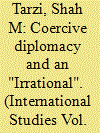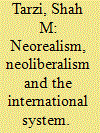| Srl | Item |
| 1 |
ID:
060445


|
|
|
|
|
| Publication |
Jan-Mar 2005.
|
|
|
|
|
|
|
|
|
|
|
|
|
|
|
|
| 2 |
ID:
080553


|
|
|
| 3 |
ID:
051526


|
|
|
|
|
| Publication |
Jan-Mar 2004.
|
|
|
|
|
|
|
|
|
|
|
|
|
|
|
|
| 4 |
ID:
166026


|
|
|
|
|
| Summary/Abstract |
This article presents select data, recent trends and empirical analysis concerning American voters’ attitudes on American foreign policy in the Trump era. Accordingly, it addresses several vital questions: (a) whether and to what extent Trump Republicans hold views that are distinct from non-Trump Republicans and from average US voters?; (b) how widespread is support for President Trump’s foreign policy?; and (c) whether partisanship has intensified? Importantly, the study deduces preliminary theoretical observations and highlights select new pathways for future research. The key findings of the article are: (a) Trump supporters hold distinct views from the general public; (b) President Trump’s positions are not popular; (c) partisanship has intensified under Trump; (d) on the broad contours of American foreign policy, the American public, including the non-Trump Republicans, express noteworthy continuity, stability and support in spite of a deeply polarizing American president. The article offers select theoretical insights, including recognition of the role of core value in ordering belief systems, thereby offering a modicum of internal coherence, stability and structure to foreign policy views of American mass public, thus transcending the traditional Almond–Lippmann theoretical consensus regarding the content of American public opinion.
|
|
|
|
|
|
|
|
|
|
|
|
|
|
|
|